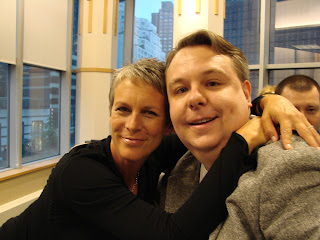There is a growing trend within
the horror genre in which aging is being employed as a mechanism of terror.
Geriatric horror—or, abridged, geri-horror—is taking the inevitably of aging
(frightening in its own right) and factors closely associated with growing
older (dementia and cognitive decline, physical deterioration, isolation and
loneliness, communities for the elderly such as nursing homes and assisted
living facilities) and examining them through the context of the horror genre.
Geri-horror is the natural
successor to the hagsploitation movement in film of the 1960s and 1970s
in which former Hollywood starlets would play deranged old women. The formula
was simple: glam it down and camp it up. This subgenre—also known as “hag
horror” or “grand dame Guignol"—captured Hollywood's seeming disdain for
older women at the time yet, in an ironic, subversive twist, gave some of these
actresses the best roles of their later careers. Think Joan Crawford and Bette
Davis in Whatever Happened to Baby Jane? (1962) or Davis (again), Olivia
De Haviland, and Agnes Moorehead in Hush…Hush, Sweet Charlotte (1964) or
Crawford (again) in Straight-Jacket (1964) or Geraldine Page and Ruth
Gordon in What Ever Happened to Aunt Alice? (1969) or Shelley Winters in
both Whoever Slew Auntie Roo? (1971) and What's the Matter with
Helen? (1971).
In geri-horror, expectations that
elderly people are kind and harmless are upended. Take Minnie and Roman
Castevet in
Rosemary’s Baby (1968), for example, who turn out not to be
frail elderly neighbors but satanic cultists and master manipulators in the
plot to bring the Antichrist into being. Keeping with the satanism theme, there’s
the entire community of senior citizens in the film
The Brotherhood of Satan
(1971) who are turning the children of a small California desert town into
Satan worshipers or the eccentric Ulmans, played by Tom Noonan and Mary
Woronov, in Ti West’s
The House of the Devil (2009) who lure a young
babysitter into a sinister trap. In 1988,
The Legend of Hell House
director John Hough employs silver screen legends Yvonne DeCarlo and Rod
Steiger to play the unhinged parents of a weird, murderous family in the
slasher
American Gothic. Earlier,
Lassie actor Arthur Space and television
actress Mary Jackson played deranged proprietors of a sham resort where
vacationing college girls were lured, fattened up, and then (literally) served
up on platters in the lurid
Texas Chainsaw Massacre cannibalism precursor,
Terror at Red Wolf Inn (1972).
At other times in geri-horror, old
age itself is the source of the horror. In the film adaptation of Peter Straub’s
novel
Ghost Story (1981), a group of elderly men calling themselves the
Chowder Society are plagued by guilt-ridden nightmares stemming from an
impulsive act in their collective past. In the film
Late Phases (2014),
werewolves preying upon the residents of a retirement community become a metaphor
for struggling to relocate a physically challenged parent against their will
into a retirement community. This one is stacked with a fantastic over-60 cast
that includes Tina Louise (
Gilligan’s Island), Rutanya Alda (
Mommie
Dearest,
Girls Nite Out,
Amityville II: The Possession,
The
Dark Half), Caitlin O’Heaney (
Savage Weekend,
He Knows You’re
Alone), Karen Lynn Gorney (
Saturday Night Fever), and Tom Noonan (
Wolfen,
The Monster Squad). In M. Night Shyamalan’s pandemic-era
Old
(2021), the acclaimed director adapts the French-language graphic novel
Sandcastle
written by Pierre Oscar Lévy from France and drawn by Frederik Peeters from
Switzerland, taking the body horror route to show aging as grotesque and
inescapable—much in the way 2024’s
The Substance does. Shyamalan’s other
geri-horror contribution—2015’s
The Visit—offered up a pair of sinister
grandparents whose increasingly bizarre and disquieting behavior is cleverly couched
within the Alzheimer’s symptom of “sundown syndrome.” Dementia takes
centerstage in
Relic (2020), an Australian gem of a cinematic metaphor about
how the disease not only wreaks havoc on the victim but also on those closest—often
caregivers.
In yet other works, aging is a
badge of honor—and a weapon in confronting horror. In
She Will (2021),
Alice Krige plays an aging actress who goes to a healing retreat after a double
mastectomy, where she discovers that the process of such surgery opens up
questions about her very existence, leading her to start to question and
confront past traumas. Likewise, Jamie Lee Curtis stepped back into her iconic
role as terrorized babysitter Laurie Strode for David Gordon Green’s trilogy
Halloween
(2018),
Halloween Kills (2021), and
Halloween Ends (2023)—only this
time her PTSD has fueled her preparedness, making her an AARP card-carrying survivalist
and Final Grandma. This theme of “Don’t Fuck with Old People” is carried out
again in
Don’t Breathe (2016) and
VFW (2019).
Requisite history lesson aside,
The
Rule of Jenny Pen (2025)—directed by James Ashcroft and written by Ashcroft
and Eli Kent, based on the short story of the same name by Owen Marshall—is the
latest, and perhaps most fully realized contribution to the geri-horror
subgenre to date. This haunting, malicious New Zealand-lensed psychological tale
of elder-on-elder abuse features Academy Award winner Geoffrey Rush as Stefan
Mortensen, a judge who suffers a stroke, mid-sentencing, from the bench. He
finds himself admitted to a nursing home (or “care home” as is the geographic
idiom) for rehabilitation. His character, seemingly friendless, is the epitome
of an entitled elite—dismissive toward women, caustic, and outright rude at
times. The post-stroke wheelchair he finds himself in does little to humble
him. Enter multiple Emmy and Tony Award winner and two-time Academy Award
nominee John Lithgow as Dave Crealy, a fellow resident who’s as kooky as he is
dangerous. Before becoming a resident, Crealy was the longtime handyman at Royale
Pine Mews and that familiarity with the facility and its grounds gives him a
different type of entitlement. He’s a geriatric bully—commandeering other
residents’ food when the well-meaning if inattentive staff isn’t looking, aggressively
shoving other residents out of the way during a dance activity, and—worst of
all—paying nocturnal visits to his fellow residents’ room in the middle of the
night to terrorize them with an eyeless hand puppet he calls Jenny Pen. The
scenes in which Lithgow demands a pledge of allegiance to the titular doll that
includes “licking its asshole” (thankfully, just the underside of Lithgow’s wrist)
are chilling to the bone. Ashcroft wisely uses Lithgow’s towering 6’4” frame to
powerfully frame the power dynamic between him and his frail elderly
counterparts.

Crealy’s cruelty to the nursing
home’s other residents varies from the humiliating (dumping a urinal full of pee
onto Mortensen’s crotch while in bed) to the downright sadistic (tugging violently
on the newly-inserted catheter of Mortensen’s roommate Tony Garfield (George
Henare) or leading a demented woman who spends the majority of her screen time
looking for the family about to pick her up and take her home any minute out of
the gated grounds where tragedy befalls her). Although Mortensen reports the
abuse, the nursing home’s administration does little to investigate, dismissing
his concerns as part of his adjustment disorder. As Mortensen’s rehab fails to
progress, he gradually loses his voice to the endemic ageism that sees the institutionalized
elderly as ignorable. Still, Mortensen is determined to bring Crealy’s reign of
terror to an end—using whatever means necessary. The film gradually builds in a
tense game of cat-and-mouse before the two geriatric foes finally square off.

Ashcroft and company do a superb
job of portraying life in a nursing home—from the near-drowning Mortensen experiences
when left unattended in a bathtub when the aide leaves to retrieve towels to
the way the center’s staff is portrayed as generally caring more about
completing tasks than listening to what their elderly charges try to tell them.
There is an intrinsic sadness hanging over Royale Pine Mews even as festive activities
take place in the background and the residents’ care needs seem tended to
adequately enough. It’s here—in the loneliness and social isolation at the end
of one’s life, when autonomy is slowly lost and hope abandoned—that the
geri-horror aspects of
The Rule of Jenny Pen really kick in. There can
be no happy ending because even if the villain is defeated, the audience knows
that there is no escape for Mortensen from the decay aging brings.
Circling back to our de facto history
lesson at the beginning of this review, The Rule of Jenny Pen is also
notable for subverting the rules of the hagsploitation subgenre—here enlisting
two Hollywood males of a certain age (Rush, 73 and Lithgow, 79) and placing
them in the psycho-biddy cinematic scenario usually reserved for women. Ashcroft
ably proves that the horrors of growing old in an ageist society aren't
reserved just for women. It’s just another bit of the understated brilliance of
this film that will likely go on to have a long shelf life.





















